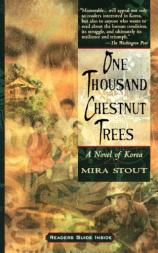Reading Group Guide
Discussion Questions
One Thousand Chestnut Trees: A Novel of Korea

1. Uncle Hong-do's visit to Vermont has a lasting effect on Anna. Discuss the differences between Hong-do's personality soon after his arrival in America and years later when he is a businessman in Fort Lee. Did he seem more American as he embraced the American dream of success or did he seem simply more capitalist?
2. When Anna spends time with Hong-do in Korea, he is again a successful businessman. Are there differences between his personality as a businessman in Korea and as a businessman in America? If so, how does this relate to Anna? If we are all influenced by our cultural surroundings, as well as our cultural heritage, how might we use this knowledge to better our society?
3. Before Anna visits Korea, she feels little connection to her Korean heritage. In what way does this contribute to problems she has with her mother? Does her exploration of her ancestry help her to better understand her mother? Discuss what Anna's voyage reveals about her mother's character and how you think their relationship could change as a result.
4. Korea's history is a particularly violent one. Discuss the Confucian attitude of compassion toward Japanese aggressors. Given the repeated atrocities that Japan perpetrated against Korea over the centuries, what do you make of this pacifism? Do you find it frustrating? Or does the national refusal to violate deeply-held beliefs in the face of horrific suffering amount to a kind of victory over their aggressors?
5. Hong-do believes that America fought against Communism rather than for Korea during the war and that the continued American presence there keeps Korea divided and weak. What do you think? Hong-do is obviously a capitalist as well as a nationalist. If South Koreans are willing to risk having their country usurped by North Korean Communists, should American troops come home? Or is this attitude unfair given the fact that America and the United Nations had to "rescue" them before?
6. Despite Anna's disappointment at being unable to visit the family estate and the temple, she does experience moments of intense spiritual connection to Korea-a sense of mystical déjà vu. Have you ever visited the land of your ancestors and felt something similar?
7. Discuss the apparent differences between Korean and American culture. How do the two cultures perceive and value the concepts of family, duty, loyalty, and history?
8. Consider the plight of Aunt Pusan, who was all but ignored by her family during her depression. Contrast Pusan with other fictional and/or historical characters who have suffered from mental illness. How does her treatment compare with theirs? Do you think Stout uses Pusan to critique 1940s Korean culture?
9. In many ways, Anna's journey to Korea is also one of self-discovery. Learning about her mother's life helps her understand the difficulties they've had in communicating. Do you think that learning about her extended family's suffering and the history of Korea helps Anna to mature in other ways?
10. When visiting her grandmother's grave, Anna realizes that "maybe it was possible to face a blank canvas and put something sincere on it." Why do you think she finds the idea of sincerity jarring? How do you think her trip has helped her to understand the source of her artwork?
One Thousand Chestnut Trees: A Novel of Korea
- Publication Date: May 1, 1999
- Paperback: 368 pages
- Publisher: Riverhead Trade
- ISBN-10: 1573227382
- ISBN-13: 9781573227384






